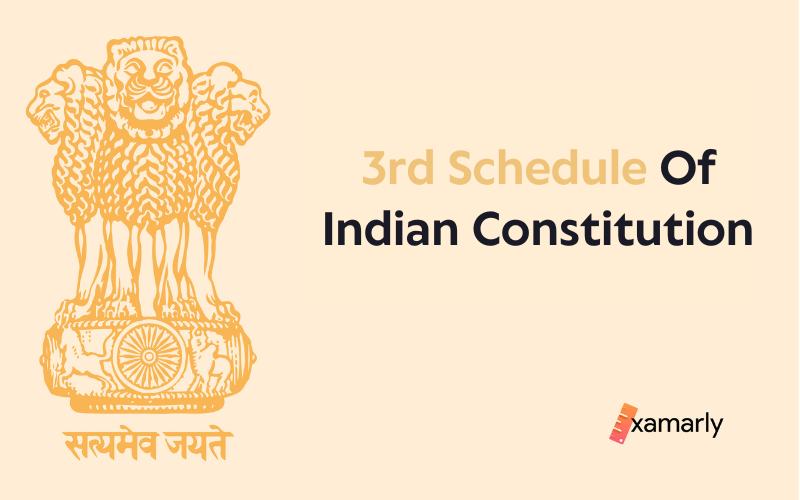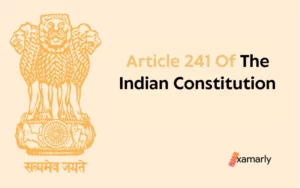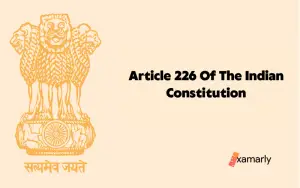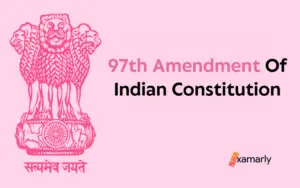The “Forms of Oaths or Affirmations” for various constitutional posts are listed in the 3rd Schedule of Indian Constitution. It covers Articles 75(4), 99, 124(6), 148(2), 164(3), 188, and 219 of the Constitution. The following article highlights the main features related to the third schedule of Indian constitution.
This article will be very helpful for UPSC aspirants.
3rd Schedule Of Indian Constitution
Schedule 3 of Indian Constitution the forms of the oaths and affirmations. This schedule was amended by the 16th Amendment Of Indian Constitution
Forms of Oath or Affirmations-
- 1. Form of oath of office for a Minister for the Union
- 2. Form of oath of secrecy for a Minister for the Union
- 3(A). Form of oath or affirmation that a candidate for Parliamentary election must take
- 3(B). Form of oath or affirmation to be made by a member of Parliament
- 4. Form of oath or affirmation to be made by the Judges of the Supreme
Court and the Comptroller and Auditor-General of India - 5. Form of oath of office for a Minister for a State
- 6. Form of oath of secrecy for a Minister for a State
- 7(A). Form of oath or affirmation to be made by a candidate for election to the legislature of a State
- 7(B). Form of oath or affirmation to be made by a member of the Legislature of a
State - 8. Form of oath or affirmation to be made by the Judges of a High Court
Major Provision
The forms of oaths or affirmations for the following constitutional positions are included in the third schedule of Indian Constitution :
- Supreme Court Judges – Article 124(6)
- Union Ministers of India – Article 75(4)
- Parliament Election Candidates
- Article 99 Members of Parliament (MPs)
- Comptroller and Auditor General – Article 148(2)
- Ministers of State – Article 164 (3)
- Candidates for State Legislature Elections-
- Article 188: State Legislature Delegates;
- Article 219: Judges of High Court;
Keywords Associated With Different Posts
- Union Ministers of India – maintain India’s independence and integrity; a secrecy oath
- Parliament Election Candidates – maintain India’s sovereignty and integrity
- Members of Parliament (MPs) – maintain India’s sovereignty and integrity
- Supreme Court Judges – uphold the laws and the Constitution
- Comptroller and Auditor General – keep the laws and the Constitution in force
- State Ministers – maintain India’s integrity and sovereignty.; Oath of secrecy
- State Legislature Elections’ Candidates – uphold the sovereignty and integrity of India
- State Legislature Members – uphold the sovereignty and integrity of India
- High Court Judges – uphold the Constitution and the laws
Why Do The President, Ministers, Legislators, and Judiciary Members All Need To Take Distinct Oaths According To The Indian Constitution?
According to our constitution, anybody seeking to hold office or assume responsibility must take an oath or affirmation. A person is obligated by an oath or affirmation to do their responsibilities well and faithfully.
As the roles and obligations of the President, the Legislators, and the judiciary differ from one another, our constitution specifically calls for distinct types of oaths for various components of our political system. This has been done in a manner that respects the titles, their roles, the kind of authority they hold, and the stature of the position. Oaths or affirmations obligate a person to carry out their responsibilities well and faithfully.
He swears to uphold true faith and obedience to the constitution upon taking the oath of office for a minister for the union. When he swears the oath for secrecy, he assumes the role of the constitutional functionary and promises not to reveal or communicate with anyone directly or indirectly.
All national business is conducted in the name of the President, who is the head of state. Furthermore, as a member of Parliament with ordinance-making rights, he serves as a legislator. Due to his position of authority over the judiciary and as the head of the armed forces, he must uphold the constitution.
A minister, on the other hand, is a member of a political party and executes his duties during times of political ups and downs; as a result, he is sworn to uphold his obligations without fear, favor, affection, or malice. He must maintain the strictest confidentiality on governmental topics. A judge must take the oath to carry out his duties honestly and without fear, favor, attachment, or malice.
Legislators are tasked with passing laws and resolving daily issues that are of national or local significance. They must swear to perform this task honestly. The duties of the judiciary members include upholding the nation’s laws and constitution. They take an oath promising to carry out their obligations to the best of their skill, knowledge, and judgment. By taking an oath, they agree to carry out their responsibilities impartially and without fear, favor, affection, or malice.
Therefore, different officials take their oaths in different ways depending on the nature of their functions and the power, dignity, and integrity of their positions.
All of them must, however, swear an oath of allegiance to the constitution, true faith, and protection of India’s sovereignty and integrity.
Conclusion
The purpose of schedule 3 of Indian constitution is to provide a full account of the oaths or affirmations required for the various constitutional posts, which are too specific to be described in the corresponding articles of the constitution.
Link of Relatable Articles are listed below. Read it by visiting the linked article for UPSC Exam Preparation.
FAQs
Which Amendment Of Indian Constitution Amended Schedule 3?
16th amendment amended the 3rd schedule of Indian Constitution.
What Is The Meaning Of An Oath Or Affirmation?
A vow on one’s honor is made in an affirmation, whereas an oath is made to a deity. Both are legally-binding declarations of truthfulness that expose the oath-taker or affirmant to perjury penalties. Always take an oath or affirmation seriously, both for the Notary and the individual taking the oath or affirmation.






